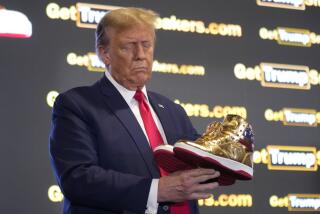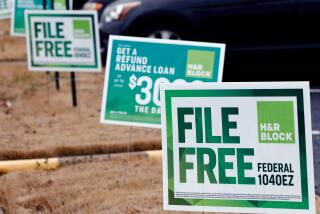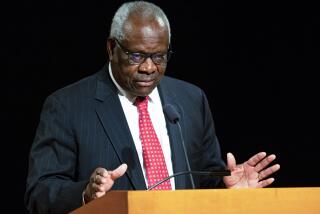CSX Paid No Income Tax in 2 of Last 4 Years
- Share via
WASHINGTON — CSX Corp., the big railroad company headed by Treasury secretary-designate John W. Snow, paid no federal income taxes during at least two of the last four years despite recording more than $1 billion in pretax profits.
Over the same four-year period, the company gave Snow $36 million in salary, bonuses, stock and options, and forgave a $24-million loan so he wouldn’t lose money along with other shareholders as the company’s stock price declined.
Although CSX’s tax and compensation practices appear to be legal, these and other aspects of Snow’s career suggest the man President Bush has chosen to head his revamped economic team may have a lot of explaining to do before he takes the oath of office.
“Treasury is supposed to make sure that the taxes are collected fairly,” said Robert McIntyre, director of Citizens for Tax Justice, an advocacy group that opposes many corporate tax breaks. “Bush has just nominated a guy who thinks it’s dandy that his company’s contributing nothing to help support the country.”
Snow’s defenders dismiss most of the criticism as politically motivated cheap shots, and express confidence he will convince Congress, and the nation, of his suitability to serve as the nation’s chief financial officer.
“The president is very confident that all the investigation that is relevant on this issue has been looked at thoroughly and fully, and that the Senate will take a look at all this as well, and that this nominee will be confirmed,” said White House Press Secretary Ari Fleischer.
Yet even if Snow successfully defends CSX’s tax returns and his own take-home pay, other issues are sure to be raised on Capitol Hill. Among them: the cancellation of loans he received to buy company stock, and his sale of CSX shares shortly before the disclosure of financial setbacks.
Similar to Bush, Cheney
Snow’s private sector resume bears a striking similarity to those of Bush and Vice President Dick Cheney. The president has been bedeviled by persistent questions about his stock sales while serving on the board of Harken Energy Corp. 12 years ago. Cheney has drawn fire for his actions as CEO of Halliburton Co., a big oilfield services firm that is under investigation for its accounting practices.
Even Snow’s critics concede they have no evidence he and his company have not played by the rules governing corporate accounting and compensation. But that may only reinforce perceptions that big business is allowed to engage in practices and enjoy tax breaks not available to ordinary taxpayers.
The company has made clear its desire to pay the government as little as possible. “CSX will pursue all available opportunities to pay the lowest federal, state and foreign taxes, consistent with applicable laws and regulations and the company’s obligation to carry a fair share of the cost of government,” the management team said in its 2001 report to shareholders. “CSX also works through the legislative process for lower tax rates.”
Snow made the same basic argument on behalf of the nation’s biggest corporations when he lobbied on Capitol Hill as chairman of the Business Roundtable in the mid-1990s. He also served on a blue-ribbon tax reform panel headed by former Cabinet secretary Jack Kemp, an aggressive champion of tax cuts.
According to an analysis of corporate disclosure documents by McIntyre’s advocacy group, which posted the results on its Internet site, CSX paid no federal income taxes in 1998, 2000 and 2001. Instead, it received federal rebates of more than $150 million by claiming a number of tax breaks, including accelerated depreciation of equipment purchases.
McIntyre’s figures appear to square with the footnotes contained in CSX’s annual reports for the four years in question. In its itemization of the company’s income tax accounting, CSX listed federal rebates of $103 million in 1998, $53 million in 2000 and $64 million in 2001, and a tax payment of $65 million in 1999.
The company said it deferred $474 million in federal taxes over the four years, which suggests it ultimately may be required to pay that amount to the government. In the meantime, it has been able to use the money for other purposes.
Over the same four-year period, Snow received salary, bonuses and other cash compensation totaling $15.6 million, CSX stock worth $8.4 million and stock options valued at $12.5 million, for a total pay package of $36.5 million, according to CSX’s filings with the Securities and Exchange Commission.
CSX is by no means the only company that has deferred taxes by taking advantage of the many deductions and credits created by Congress to boost corporate cash flow and encourage new investment. In fact, the White House is expected to propose expanded business write-offs as part of a new tax-cut initiative it will unveil early next year.
Analysis Disputed
CSX and White House officials disputed some aspects of McIntyre’s analysis, saying the company had avoided paying federal taxes in only two years, 1998 and 2001. They said they could not explain the discrepancy between the two sets of figures, but insisted the company had done nothing wrong.
“Throughout John Snow’s tenure as chairman of CSX, the company has been a significant payer of federal income taxes,” said CSX spokesman Adam Hollingsworth, adding that the company made federal tax payments in nine of the 11 years since Snow became chairman in 1991.
Hollingsworth said the company paid no federal income taxes in 1998 and 2001 because of the tax advantages of reduced operating income, large capital expenditures, and large deductible interest payments on debt. But he declined to divulge figures, and said he could not immediately respond to a reporter’s request to make public the company’s income tax returns.
A spokeswoman for Sen. Charles E. Grassley (R-Iowa), incoming chairman of the Senate Finance Committee, said the senator was reserving judgment about CSX’s tax payments until the committee’s vetting process is completed. “The committee’s questionnaire for nominees asks detailed questions about financial dealings, conflicts of interest, etc., so questions about CSX’s taxes are likely to be part of the vetting process,” the spokeswoman said.
The tax flap is only one of the issues the committee is likely to explore as it looks at Snow’s record at CSX, which operates the largest rail network in the eastern United States.
Questions are being raised about a $24-million loan Snow received from CSX in 1996 to help him purchase $32-million worth of company stock as a performance incentive. Instead of rising, the price of CSX stock subsequently declined, reducing the value of Snow’s holdings to less than the loan balance.
Quid Pro Quo Questions
In 2000, the board agreed to forgive the outstanding loans to Snow and other CSX executives who had made similar stock purchases. At about the same time, two members of the company’s compensation committee purchased vacation property worth millions of dollars from CSX subsidiaries, leading some critics to question whether there had been a quid pro quo.
“This is as egregious as anything we’ve come up against with any company,” said William B. Patterson, director of the investment office of the AFL-CIO, which called attention to the loan cancellation. “The company gave the management a significant upside if the company did well. When that didn’t happen, it just scrapped the plan and gave the money back. That’s contrary to the spirit of pay for performance.”
In the wake of recent corporate scandals, notably last year’s collapse of Enron Corp., such company loans to executives were banned under reform legislation recently signed into law.
Another potential problem area is Snow’s sale of 120,000 shares of CSX stock in August. Shortly after he sold the stock, the company announced that its financial condition was weakening, and the stock price fell. There is no evidence that Snow was anticipating the negative news when he sold. But it was the same basic sequence of events that has created problems for Cheney, who sold much of his Halliburton stock shortly before the oil field services company disclosed unexpected financial liabilities in late 2000.
White House officials, congressional Republicans, political analysts and financial experts were quick to defend Snow’s record at CSX, noting that he is widely regarded as an effective corporate manager who insists on playing by the rules.
“He did nothing wrong,” said Charles Gabriel, senior Washington analyst for Prudential Securities. “This is a publicly traded company that’s using the congressionally enacted tax laws to try to stay in business and advance its cause and take care of its stakeholders. What’s wrong with that?”
Dick Barsness, a management professor at Lehigh University, said Snow has performed ably during “a very difficult period for the railroad industry.” Profit margins have been low for years, he said, and carriers have faced daunting challenges as they try to modernize their systems and improve service.
“In this environment it would be hard for any leader to be brilliant,” Barsness said. “But Jack Snow has been solid and forward-looking in positioning CSX for more prosperous days ahead. This is no small achievement.”
Rep. Christopher Cox (R-Newport Beach) said CSX appeared to have followed acceptable accounting practices, and that he did not think the criticisms of Snow and CSX would create serious problems for Bush’s nominee.
“The early book on secretary-designate Snow is that he’s going to be speedily confirmed with bipartisan support,” Cox said.
Even if Snow is a shoo-in, some lawmakers said the disclosures raise legitimate questions about existing law and administration priorities.
“He needs to be asked during the confirmation process whether he’s willing to look at these kinds of deductions,” said Rep. Robert T. Matsui (D-Sacramento). “He has to ask himself philosophically, should a profitable company ever be in a position where they don’t pay taxes?”
*
Times staff writer James Gerstenzang contributed to this report.
More to Read
Inside the business of entertainment
The Wide Shot brings you news, analysis and insights on everything from streaming wars to production — and what it all means for the future.
You may occasionally receive promotional content from the Los Angeles Times.











